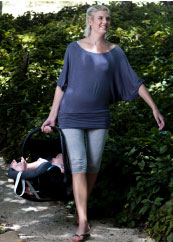It is not only during pregnancy and labour that a woman faces physical and emotional challenges. Behnaz Sanjana asks some pertinent questions related to postpartum care.
The birth of a baby is a milestone event in a woman’s life, and a much celebrated one at that. A great deal of information is available on the stages of pregnancy and the actual episode of birth; but, thereafter, the spotlight (in general) is mainly on the baby’s wellbeing, leaving new mums and the niggles they face in a grey area.
Dr Vandana Kumar, obstetrics and gynecology specialist at Bahrain Specialist Hospital, feels we often fail to acknowledge the colossal adjustments the woman and her family have to make in the period after birth and the profound psychological, social and domestic changes that occur in this critical period.
She says: “Childbirth can affect a woman both physically and psychologically. Physically it is a period of intense ‘labour’ and most definitely results in fatigue and body, pelvic and perineal pain, which resolves within a few days. The uterus, which has grown exponentially during pregnancy, takes about six to eight weeks to come back to its pre-pregnancy size. Perineal tears and lacerations tend to heal rapidly in the two to three weeks postpartum.”
Dr Vandana goes on to say that the pressure of the baby’s head on the bladder, urethra and the nerves in the pelvic area can cause some disturbances in the function of bowel and bladder for a few days to weeks. She adds: “After vaginal childbirth, there can be soreness and discomfort from the episiotomy or perineal tears, even in those with an intact perineum. These will heal in three to four weeks. The bleeding and discharge (lochia) can continue for a few weeks, too.”
 After childbirth, the body slowly gathers itself to get back to normal. The high levels of pregnancy hormones begin to nosedive, putting the body through many changes. A very common complaint new mothers have is about their crowning glory. “Women claim that their hair becomes thinner, frizzier and coarser after childbirth. The explanation for the thinness, at least, is that the changes in hormonal levels cause hair loss more rapidly once you’ve given birth,” says Dr Vandana. “During pregnancy, extra oestrogen elongates the growth cycle of your hair, causing less hair to fall out. Hair is fuller and most lustrous during the last trimester. Once oestrogen levels return to normal, there is hair fall. The rate of hair growth and loss will get back to normal in about nine months to a year.”
After childbirth, the body slowly gathers itself to get back to normal. The high levels of pregnancy hormones begin to nosedive, putting the body through many changes. A very common complaint new mothers have is about their crowning glory. “Women claim that their hair becomes thinner, frizzier and coarser after childbirth. The explanation for the thinness, at least, is that the changes in hormonal levels cause hair loss more rapidly once you’ve given birth,” says Dr Vandana. “During pregnancy, extra oestrogen elongates the growth cycle of your hair, causing less hair to fall out. Hair is fuller and most lustrous during the last trimester. Once oestrogen levels return to normal, there is hair fall. The rate of hair growth and loss will get back to normal in about nine months to a year.”
Although, traditionally, the postnatal period is thought to last six weeks, our expert claims that it takes up to a year for a woman to recover completely from childbirth. Some amount of pelvic widening that happens during delivery might even persist.
A lesser known fact, that many new mothers are unaware of, is the weakening of immunity after delivery. It is a time when new infections set in or ones smoldering during pregnancy flare up. “To avoid infections, you need to eat well and eat right during this period. Stay hydrated. Continue using multivitamin supplements, including vitamin D and calcium, and make sure you are up to date on immunisations. Most importantly, get enough rest,” advises our expert.
 Another term often heard while talking about the after effects of child birth is ‘baby blues’, wrongly interchanged with postpartum depression. “We need to differentiate between these two distinct conditions. Baby blues, or postnatal blues, typically occur in 50-70 per cent of women. The associated anxiety is usually focused on breastfeeding and its onset often coincides with the milk ‘coming in’ on the third or fourth day. It is often precipitated following a particularly poor night of sleep that may have included vivid nightmares.
Another term often heard while talking about the after effects of child birth is ‘baby blues’, wrongly interchanged with postpartum depression. “We need to differentiate between these two distinct conditions. Baby blues, or postnatal blues, typically occur in 50-70 per cent of women. The associated anxiety is usually focused on breastfeeding and its onset often coincides with the milk ‘coming in’ on the third or fourth day. It is often precipitated following a particularly poor night of sleep that may have included vivid nightmares.
“The baby blues usually encompass mood swings, sadness, anxiety, crying spells, feeling overwhelmed, loss of appetite or trouble sleeping, and last a few days or a week. The symptoms are not severe and do not need treatment, and the cause of baby blues is probably a combination of psychosocial factors and hormonal factors,” explains Dr Vandana.
The symptoms of postnatal depression, on the other hand, can occur any time in the year following delivery and are more severe, such as suicidal feelings or thoughts of harming the baby, and most definitely need to be treated. “Seek medical help if your baby blues don’t go away after two weeks, become more intense, develop into thoughts of harming yourself or your baby and hamper your everyday life,” the doctor warns.
 Another issue that many women experience around the time of birth or after it is pelvic floor dysfunction. “The pelvic floor is the complex of muscles and ligaments that support the pelvic organs, including the uterus, bladder and rectum. Vaginal delivery is known to be associated with trauma to the pelvic floor. In some cases, this can lead to issues with urinary or bowel incontinence and pelvic organ descent (sagging of inner organs) or sexual dissatisfaction; either immediately postpartum or in the woman’s later years,” Dr Vandana informs.
Another issue that many women experience around the time of birth or after it is pelvic floor dysfunction. “The pelvic floor is the complex of muscles and ligaments that support the pelvic organs, including the uterus, bladder and rectum. Vaginal delivery is known to be associated with trauma to the pelvic floor. In some cases, this can lead to issues with urinary or bowel incontinence and pelvic organ descent (sagging of inner organs) or sexual dissatisfaction; either immediately postpartum or in the woman’s later years,” Dr Vandana informs.
She goes on to explain that as the fetal head passes through the vagina during normal delivery, some of the attachments of the pelvic organs and nerves are pulled away and injured, causing sagging later on. Avoiding prolonged and early pushing during the second stage of labour and good perineal support might prevent these problems to a certain extent. Also, performing Kegel’s perineal and abdominal exercises in the postnatal period helps in prevention.
So how does a woman ensure her sanity in this period of dramatic changes? Dr Vandana gives us some pointers: “Even though you may be very excited and have requests for lots of visits from family and friends, try to limit visitors and get as much rest as possible in the first few days after childbirth.” She advocates sleeping whenever the baby is asleep and asking family and friends for help. “It is important to make time to go out and visit friends and discuss your feelings with your partner, family or other mothers. Avoid making major life changes during pregnancy or right after giving birth to spare you unnecessary stress. Try to arrange support and help in your new situation ahead of time.”





































